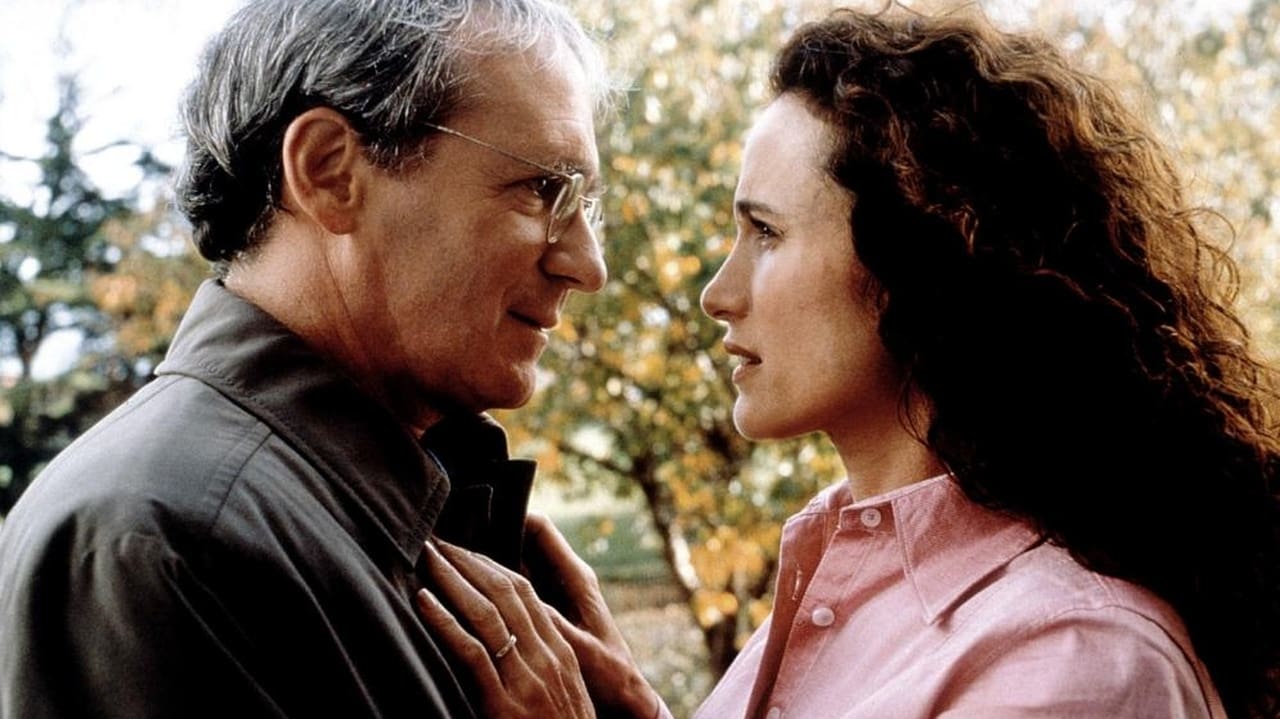NekoHomey
Purely Joyful Movie!
ScoobyWell
Great visuals, story delivers no surprises
Stephan Hammond
It is an exhilarating, distressing, funny and profound film, with one of the more memorable film scores in years,
Gary
The movie's not perfect, but it sticks the landing of its message. It was engaging - thrilling at times - and I personally thought it was a great time.
Amy Adler
Ria (Olivia Williams) lives in Dublin with her husband and two children, a newly teen girl and son a couple of years younger. Their residence is called Tara Road. Alas, bad, hurtful news arrives soon enough. After a birthday party for her younger child, hubby announces that he has a galfriend on the side and she's pregnant. Devastated, Ria doesn't know which way to turn. Meanwhile, across the Atlantic, Marilyn (Andie McDowell) is equally in despair. Her only child, a teen son, had a motorcycle accident and passed away, also at a birthday party. Not even her caring husband can raise her spirits. She sends him off to a vacation in Hawaii alone, for she has other plans. A while ago, Marilyn heard of a house swap in Dublin and calls the number. It's Ria, who answers in the middle of the night. Nevertheless, this exchange sounds just like what she needs, too. So, off Ria goes to Connecticut while Marilyn boards a plane to Ireland. Slowly, the plan works. Marilyn meets a gardener/chef Colin (Stephen Rea) whose gentle attention and good humor helps this Yankee immensely. Then, Ria is beset with Marilyn's good buddies who plan outings and conversations. But, is there still some secrets to uncover? If it is so, will Ria and Marilyn learn to unlock their hearts again? This lovely movie has too little of Ireland but otherwise is great! Actually, the scenes in Dublin are wonderful and so are the venues in the States. In addition, the acting is touching, with Williams and McDowell giving carefully nuances performances and the supporting cast, even the so-called villains, doing fine work, too. Costumes, script and steady direction help move the film admirably to the end. Are you a person grieving the loss of someone important or do you just like romantic, thoughtful dramas? Then, tarry someday with Tara Road very soon.
gradyharp
TARA ROAD is a thickly populated movie that reaches for the female audience and succeeds in addressing old problems of infidelity and marriage conflicts. The problem is the story by highly published Irish author Maeve Binchy (adapted from Binchy's novel for the screen by Cynthia Cidre) is 'used goods' and while there are many moments of touching dialog there are equal moments of sham resolutions that in the end prove disappointing despite the cast of actors portraying these only occasionally interesting characters.Two women, each bruised by life events, trade homes (Dublin, Ireland and Connecticut) to find the space to recover. In Connecticut, Marilyn (Andie MacDowell) is recovering from the accidental motorcycle (a birthday gift from his father Greg - August Zirner) death of her young son: grief has made her withdraw and lose her feelings for Greg. In Dublin, Ireland Ria (Olivia Williams) is blissfully happy in her beautiful home on Tara Road which she shares with her two children and her newly discovered unfaithful husband Danny (Iain Glen) - a lothario who has had affairs with Ria's best friend Rosemary (Maria Doyle Kennedy) and now confesses to the pregnancy of his current mistress Bernadette (Heike Makatsch). In too quick an instance Ria and Marilyn decide to swap homes with the hope that separation form their families will give them room to readjust to life. Each woman encounters the friends and neighbors of the other: Marilyn meets restaurateur Colm (Stephen Rea) among Ria's odd assortment of acquaintances while Ria encounters the brother of Greg and some intrusive and over the top friends of Marilyn. Gradually it all comes to a very predictable conclusion that simply solves too many problems too easily.Director Gillies MacKinnon seems to have difficulty deciding how to maintain a tone for the film - a tearjerker versus a situation comedy. There are moments when the audience connects with some of the characters, but these are too few and separated by far too many stretches of weak writing. Despite some fine acting the movie never quite flies. Grady Harp
Vomitron_G
Between all this summer blockbuster mayhem, the premise of TARA ROAD seemed like a welcome change. I prepared myself to see a well-acted drama with a touch of subtle comedy, driven by a solid plot able to strike the right chords. When it comes to the acting and the afore-mentioned genre description my assumptions proved to be right. The plot on the other hand...The basic idea of the movie certainly is interesting. Andie MacDowell (respectable as always) plays a married American woman who loses her 15-year-old son in a motorcycle accident. Around the same time, somewhere in Ireland, Olivia Williams (another respectable actress) is told by her husband that he's going to leave her for his younger and pregnant girlfriend. Through an impulsive phone-call by MacDowell, the two women get in contact (for the first time!) and without knowing each other's background, they suddenly decide to swap houses for a few months.I never read the bestseller by Maeve Binchy, so I can't compare it to this motion picture. But in the movie director Gillies MacKinnon introduces some interesting characters to the audience, only he doesn't do much with them. Both women take this perhaps life-altering decision to come to terms with the recent dramatical events in their lives. But eventually the road they choose to take just leads to nowhere. No renewed visions on their lives, no reflections on their past. So this clearly isn't the good movie that TARA ROAD should have been.At one point the Irish Ria encounters a possible love-interest at the doorstep of her American home (or at least the opportunity to have sex with no strings attached...). But does she indeed take that chance? In Ireland there was this scene in Stephen Rea's restaurant where, during a quiet dinner, the American Marilyn gets invited to sit at the table of a bunch of Ria's friends (including her cheating husband and his girlfriend). This was the most suitable moment to insert some clever, cynical dialogues, a slip of tongue by one of the characters, a misinterpretation of some sort or a subtle stab below the belt. Unfortunately, none of all that. I won't give away what does happen during that dinner, but it was not what I wanted to see.Those two random scenes perfectly describe the final feeling I was left with when this movie was finished: missed potential. Add to that a predictable happy ending where even the cheating husband gets what he deserves (what that exactly means, you can see for yourselves if you still want to see the movie) and it's safe to say that there were more things I disliked than otherwise. There still were a few enjoyable scenes in it, though, like the scene where Ria starts smashing Marilyn's expensive vases (let's see if you see that one coming), or the ones where Iain Glenn tries to get what he wants by telling subtle lies and sweet-talking everybody. But those were just a few raindrops in a puddle of mud. And when the story is over and done with, you have the feeling that both women could have just as well stayed at home to solve their problems.Maybe slightly older people (or let's say: adult married or divorced couples with teenage children) can relate better to this movie (and thereby appreciate it more). It probably has something to do with the urge to find new challenges in life, but feeling just a bit too old to accept/undergo the consequences of the changes they cause. I have no idea, but I didn't get much out of TARA ROAD.
uta-7
One of Maeve Binchey's most popular novels, complete with a useful American angle, this was an obvious choice for the big screen. However, the story of two women (one Irish, one American) who house-swap makes for a difficult transition in practice. Quite a long novel, it also compresses awkwardly, losing much of its charm and intelligence along the way. The film is not helped by lack-lustre central performances. MacDowell seems out of practice, and Williams (almost invariably seen hitherto in starchy British roles) does not make a convincing Irish housewife. Her emoting seems brittle (even shrill) and she seems uncomfortable with emotion generally. Overall the film looks good and is well filmed, but does not hold the attention except perhaps for die-hard Binchey fans, many of whom will be disappointed at the inevitable over-simplification.

